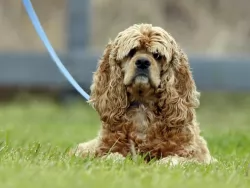 MyDogBreeds
MyDogBreeds Dutch Shepherd is originated from Netherlands but American Cocker Spaniel is originated from United States. Dutch Shepherd may grow 22 cm / 9 inches higher than American Cocker Spaniel. Dutch Shepherd may weigh 18 kg / 40 pounds more than American Cocker Spaniel. Both Dutch Shepherd and American Cocker Spaniel has same life span. Dutch Shepherd may have more litter size than American Cocker Spaniel. Both Dutch Shepherd and American Cocker Spaniel requires Moderate maintenance.
Dutch Shepherd is originated from Netherlands but American Cocker Spaniel is originated from United States. Dutch Shepherd may grow 22 cm / 9 inches higher than American Cocker Spaniel. Dutch Shepherd may weigh 18 kg / 40 pounds more than American Cocker Spaniel. Both Dutch Shepherd and American Cocker Spaniel has same life span. Dutch Shepherd may have more litter size than American Cocker Spaniel. Both Dutch Shepherd and American Cocker Spaniel requires Moderate maintenance.
 The Dutch Shepherd is of Dutch origin, hailing from the Netherlands. They were originally used as herding dogs on the farms, where they became a jack-of-all-trades type of dog.
The Dutch Shepherd is of Dutch origin, hailing from the Netherlands. They were originally used as herding dogs on the farms, where they became a jack-of-all-trades type of dog.
The Dutch Shepherd in those days, 100 odd years ago, were also known as Hollandse Herders.
These dogs are more rare in modern days, but when you do find them, they are being used as police or security dogs, as guides for the blind, or simply as family friends.
 Descended from the English Cocker Spaniel when the latter were brought to the United States in the late 1800s. American hunters wanted a smaller dog for bird hunting, so they crossed them with smaller spaniel breeds. The English and the American Cockers were considered the same breed until 1935 when the American Kennel Club officially separated them into 2 distinct breeds. After this the American Cocker’s popularity increased dramatically.
To this day they are one of the most popular breeds in the U.S. Recently their popularity has spread back to England. The American Cocker Spaniel has evolved from a hunting dog life to a very popular family pet.
Descended from the English Cocker Spaniel when the latter were brought to the United States in the late 1800s. American hunters wanted a smaller dog for bird hunting, so they crossed them with smaller spaniel breeds. The English and the American Cockers were considered the same breed until 1935 when the American Kennel Club officially separated them into 2 distinct breeds. After this the American Cocker’s popularity increased dramatically.
To this day they are one of the most popular breeds in the U.S. Recently their popularity has spread back to England. The American Cocker Spaniel has evolved from a hunting dog life to a very popular family pet.
 The Dutch Shepherd dog is very similar in appearance to the popular German Shepherds, being a medium to large sized dog.
The Dutch Shepherd dog is very similar in appearance to the popular German Shepherds, being a medium to large sized dog.
The males are slightly heavier than females, but both males and females can stand between 55 and 62cm and weigh between 20 and 32kg.
There are actually 3 varieties found in the Dutch Shepherd dogs - short-haired, long-haired, and wiry or rough-haired. The dog has a double coat, consisting of a woolly undercoat and a top coat. The basic color of the coat is gold or silver through to red, giving rise to the brindle variations. Too much black or white seen in the fur is considered a fault.
In 1914 it was decided that brindle coats would distinguish them from the others.
The eyes of the Dutch Shepherd are dark, almond shaped and slightly slanting, while the medium sized ears are erect and high on the head and the thick tail is slightly curved. The dog has an unusually long tongue which is often found hanging out.
Early training and socializing for this dog is important so that he can learn to stay calm around new people, or visitors to the property.
The beautiful Dutch Shepherd doesn’t like being left alone for too long, loving rather to be involved with all that the family is involved in. They get on well with other pets in the home as well as being child-friendly.
They are happy dogs, who can also be smart and cunning, therefore highly trainable. They soak up new commands easily. Dutch Shepherds are also good watchdogs as they are fiercely loyal, and do not take kindly to strangers.
 The American Cocker spaniel is a sturdy dog of medium size. The have a rounded head with a broad and deep muzzle. The jaw is even and square while the teeth have a scissors bite. The American Cocker has round eyes that are almost always dark with the exception of the Merle who can have blue colored eyes. They have long ears and a docked tail in the U.S. Docking is illegal in most of Europe. The American Cocker bred for field hunts have shorter coats than those bred for show. Grooming is essential for this longhaired breed. It is especially important for the eyes and ears to be kept clean.
The American Cocker spaniel is a sturdy dog of medium size. The have a rounded head with a broad and deep muzzle. The jaw is even and square while the teeth have a scissors bite. The American Cocker has round eyes that are almost always dark with the exception of the Merle who can have blue colored eyes. They have long ears and a docked tail in the U.S. Docking is illegal in most of Europe. The American Cocker bred for field hunts have shorter coats than those bred for show. Grooming is essential for this longhaired breed. It is especially important for the eyes and ears to be kept clean.
 Your alert, intelligent and somewhat rare Dutch Shepherd is a loyal, protective dog, and while he can be aggressive around intruders and be a great guard dog, he can also be a gentle, loving animal around his human family members.
Your alert, intelligent and somewhat rare Dutch Shepherd is a loyal, protective dog, and while he can be aggressive around intruders and be a great guard dog, he can also be a gentle, loving animal around his human family members.
Though his tongue is long and often hangs out, you won’t have to contend with drooling. He is a wonderfully active dog and doesn’t easily gain weight. He isn’t a barker or howler, and his exceptional intelligence makes him highly trainable.
Whether there are children or other animals in the house, you can rely on your Dutch Shepherd to get on well with them, making him a wonderful family pet and canine friend.
 This is a gentle, happy dog. They are high energy, high spirited, friendly dogs who like people and other animals alike. They are happy to be with you and want to please you. He can find a home in the country and in the city alike. He is inquisitive and easy to train.
This is a gentle, happy dog. They are high energy, high spirited, friendly dogs who like people and other animals alike. They are happy to be with you and want to please you. He can find a home in the country and in the city alike. He is inquisitive and easy to train.
But be warned they can be stubborn and hard to housebreak. They can be shy and need a lot of socialization as a pup. They can take over a household if you are not the strong pack leader they need. They have a tendency to urinate when excited and must live inside with the family. They are far too social to be left outside. An unhappy, unstable cocker can be into resource guarding of things, spaces and people. They can bark obsessively or be hyperactive. They must have a loving home with the family.
 The Dutch Shepherd dogs are the healthiest of the Shepherd breeds. They have relatively few health problems.
The Dutch Shepherd dogs are the healthiest of the Shepherd breeds. They have relatively few health problems.
However, like the German Shepherds they may develop hip dysplasia, but this is in fact fairly rare. Get your pet to the vet if you suspect this in your dog because it can lead to lameness.
In 2018 the University of Minnesota identified a disease in Dutch Shepherds called Miositis. This is an inflammatory myopathy causing painful inflammation of the skeletal muscle tissue.
 Perhaps the least of the American Cocker Spaniel’s health concerns are the tendency to overeat and become obese. The more serious concerns include glaucoma, cataracts, dysplasia, allergies, Cherry eye, lip fold pyoderma, liver disease, cardiomyopathy, and congestive heart failure (CHF).
Perhaps the least of the American Cocker Spaniel’s health concerns are the tendency to overeat and become obese. The more serious concerns include glaucoma, cataracts, dysplasia, allergies, Cherry eye, lip fold pyoderma, liver disease, cardiomyopathy, and congestive heart failure (CHF).
The most serious health issue the breed faces is IMHA or Immune Mediated Hemolytic Anemia which can be deadly. In fact, it is almost always fatal and comes on quickly. With this condition the dog can bleed out internally and there is little that veterinary medicine can do.
 Unfortunately Dutch Shepherds shed quite a bit of hair during their shedding period in spring and autumn. This makes regular brushing important during these seasons so as to remove the dead hairs, especially from the undercoat.
Unfortunately Dutch Shepherds shed quite a bit of hair during their shedding period in spring and autumn. This makes regular brushing important during these seasons so as to remove the dead hairs, especially from the undercoat.
The wire- or rough-haired variety shouldn’t be brushed but should rather be groomed by a professional groomer every 6 months or so.
Their nails need to be trimmed when necessary, to avoid cracking, splitting, or an injury.
Their ears can be cleaned weekly to get rid of any debris or wax build-up. This, if left, can lead to infection. Brush his teeth 2 or 3 times a week to avoid dental disease which brings on a host of illnesses.
These dogs do need regular exercising, and at the same time need to be physically and mentally stimulated. He is the kind of dog that has been used for herding purpose on the farm and he just craves activity. Take him with you on your walks and include him in ball games, hikes, jogging, swimming or when you go cycling – he is game for all kinds of activities.
The formula for their diet would be that of a medium to large dog with high energy levels. The top commercially manufactured foods have been developed to include all the important vitamins and minerals. Fish oil can also be added to their food to keep the coat shiny.
Add in cooked rice, cooked vegetables and chicken from time to time and be sure to add in some raw meat occasionally to prevent problems with the skin. Always ensure that your pet has fresh, cool water to drink.
 The American Cocker Spaniel breed requires attention to detail and making sure your puppy gets enough and your adult doesn’t get too much. Feed the pups twice a day until they reach the age of 4 months and then cut them back to the adult dose of once a day at supper time. Feed from a cup to a cup and a half.
The American Cocker Spaniel breed requires attention to detail and making sure your puppy gets enough and your adult doesn’t get too much. Feed the pups twice a day until they reach the age of 4 months and then cut them back to the adult dose of once a day at supper time. Feed from a cup to a cup and a half.
not previously mentioned include Ectropion and Entropion, Prolapse of the nicititans gland, gastric torsion and elbow dysplasia. Have your puppy tested for eye diseases and any issues with the knee and hip. These are social dogs and will not do well alone outside. They need to live inside.
The American Cockers love to play and need a lot of exercise. Nice long walks, games of fetch or even agility will keep your Cocker happy. have plenty of stamina and need regular exercise. They also enjoy a good hunt.